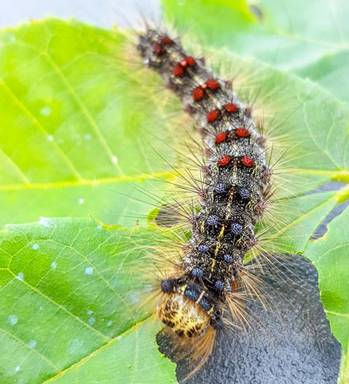THIS AND THAT FROM THE CARO GARDEN CLUB PRESIDENT - JUNE
- joycemuz56
- Jul 1, 2022
- 2 min read
Native bees thrive even in deserts
Semi-arid and arid states of the southwestern United States boast some of the highest concentrations of bee diversity anywhere in the world, says Dane Wolfe, conservation educator based in Wooster, Ohio.
In the May/June 2022 edition of “The American Gardener” (the magazine of the American Horticultural Society), Wolfe writes: “With mostly dry ground and little rain, the deserts of California, Nevada, Utah, Arizona, and New Mexico offer the ideal environmental conditions for ground-nesting bees to thrive. Since 70 percent of native bees in the U.S. are ground nesting, the desert is a great place to encounter them.”
New name for an old pest

The Governing Board of the Entomological Society of America has formally adopted “spongy moth” to replace “gypsy moth” as the new common name for Lymantria dispar, a destructive pest of forests and urban trees. The Michigan Extension Service issued a news release about the name change as well as what you can do to protect your trees. See: “Spongy moth, formerly gypsy moth, season starts soon.”
Grave plots as pollinator gardens? Why not?
Instead of placing flowers that die on the graves of loved ones, why not plant flowering bulbs that will live for years and help pollinators as well?
Since cemetery rules often prohibit anything that interferes with grass mowing, consider very early blooming bulbs that disappear before the first mowing of spring. Examples that are deer and rodent resistant are: Winter Aconite (Eranthis hyemalis/ “Winter Wolf’s Bane”) and Glory-of-the-Snow (Chionodoxa forbesii).
These bulbs are easy to plant -- just a quick push with a hand spade through the grass creates a slit deep enough in which to drop the tiny bulbs.
Winter in June

Caro Garden Club members Linda Mason (left in photo) and Toni Wilding (right) joined Kathy Sauber in preparing a “winter tree” with “ice crystals.” It will be one of four seasonal trees displayed at the October District VI Fall Meeting featuring the theme “Seeing Trees.”
The meeting will be held in Midway Hall at the Caro fairgrounds and will host members of garden clubs throughout The Thumb. Featured speakers will be Chuck Martin, Horticulturalist and Grounds Manager of Dow's Whiting Forest Canopy Walk, and Dr. Gregory Bonito, Department Chair of Mycology at MSU.
Mycology is gaining more interest in the international scientific community as knowledge of the importance of fungi increases. See “The Future Is Fungal: why the ‘megascience’ of mycology is on the rise.”



Comments